Animating the Landscape
Place-based workshop in Madison, Wisconsin
14.05.2018 – 17.05.2018
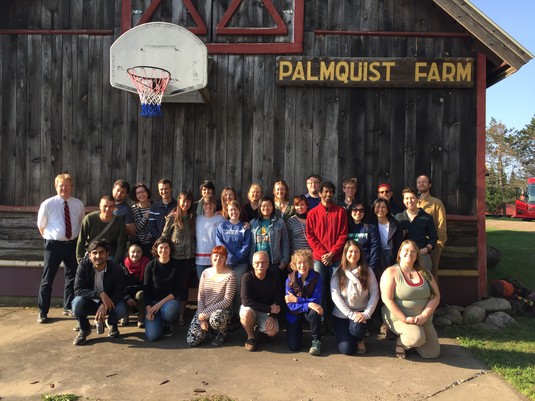
Photo Credit: Lynn Keller.
The 2018 Place-Based Workshop took place May 14–17, 2018.
The Place-Based Workshop was organized by the Center for Culture, History, and Environment (CHE), University of Wisconsin-Madison (UW-Madison). The RCC and CHE have been collaborating for several years now. In the past, doctoral students and environmental studies students from Munich have traveled to Wisconsin for workshops and vice versa.
The Place-Based Workshop is one of CHE’s most important annual activities and fulfills a core requirement of the CHE certificate. Most of all, it is a wonderful opportunity for members of the CHE and RCC communities to get to know each other on a more personal basis, while exploring environmental history themes via interdisciplinary conversations that are the reason for the Carson Center’s existence.
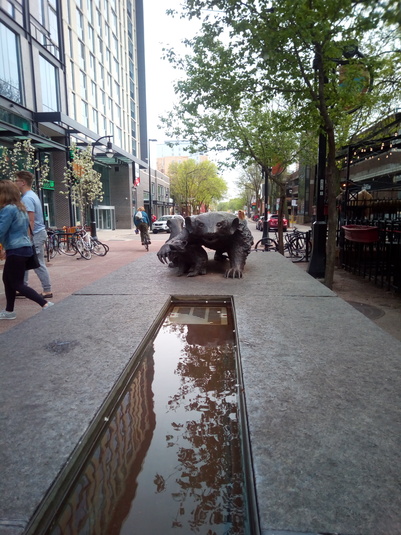
Photo Credit: Katharina Müller.
Monday, 14 May 2018
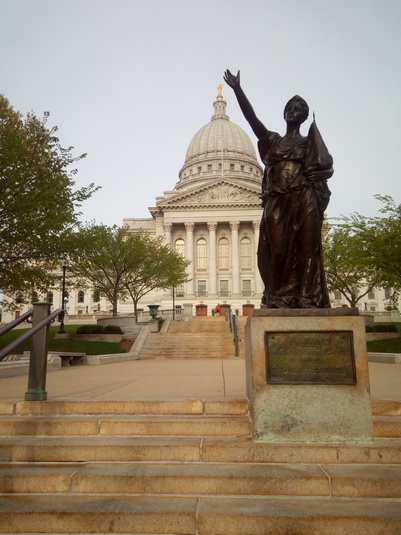
Photo Credit: Katharina Müller.
After a small introduction, the panel about “Wildlife Management and Implications for Animal, Human, and Ecosystem Health in Wisconsin,” hosted by Elizabeth Hennessy, was first on the agenda. Tim Van Deelen (professor in the Department of Forest and Wildlife Ecology and the Beers-Bascom Professor in Conservation at UW-Madison), Don Waller (teaches ecology, evolution, and conservation biology at UW-Madison), Keith Warnke (Hunter and Angler Recruitment, Retention and Reactivation at the Wisconsin Department of Natural Resources), Michael Samuel (emeritus professor in the Department of Forest and Wildlife Ecology at UW-Madison), and Bryan Richards (emerging disease coordinator at the USGS National Wildlife Health Center [NWHC] in Madison, Wisconsin) discussed population biology of wolf recovery, deer overabundance, hunting, and the dangers of chronic wasting disease.
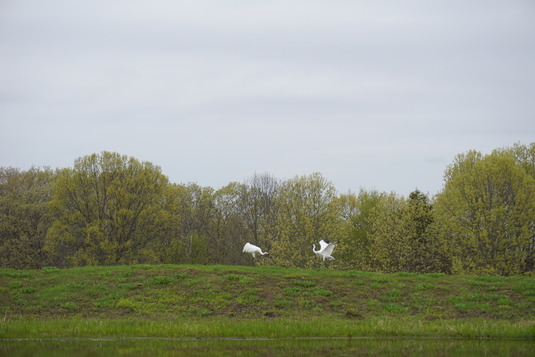
Photo Credit: David Stäblein.
Then, we headed for Baraboo, Wisconsin, where we were introduced to the International Crane Foundation by Curt Meine, the foundation’s research associate. He also spoke about enduring conservation legacies. After a tour, we were able to talk to Rich Beilfuss (president and CEO of the International Crane Foundation) and Buddy Huffaker (executive director of the Aldo Leopold Foundation in Baraboo, Wisconsin).
Tuesday, 15 May 2018
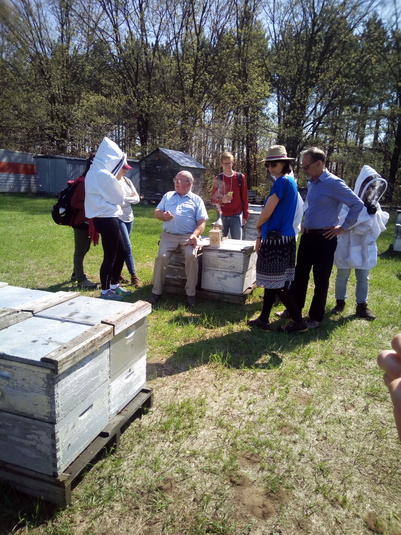
Photo Credit: Katharina Müller.
The next day, we were able to witness commercial beekeeping at Henry’s Honey Farm with John Piechowski (owner of Henry’s Honey) and Sai Suryanarayanan (assistant scientist in the Population Health Institute at UW-Madison, and a former Carson fellow). The farm’s focus is on honey bees, commercial pollination, honey, and beeswax.
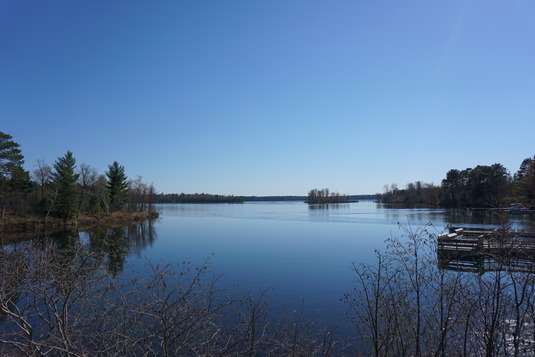
Photo Credit: David Stäblein.
Afterwards, we learned about treaty rights and the spearfishing wars through the stories shared by Larry Nesper (professor of anthropology and American Indian studies at UW-Madison), Brooks Big John (currently on the tribal council and holding a tribal chair of the Lac du Flambeau Band of Lake Superior Chippewa Indians), and Tom Maulson (served as president of the Lac du Flambeau Band of Lake Superior Chippewa Indians for 12 years) at the Lac du Flambeau reservation in Wisconsin. The talk focused mainly on the importance of this traditional hunting technique and Maulson’s central role in the conflict over the exercise of off-reservation treaty rights in the 1980s and early 1990s. Later that afternoon we toured the Poupart Fish Hatchery with Larry Wawronowicz (natural resource director for the Lac du Flambeau Band of Lake Superior Chippewa Indians). Here, he outlined the efforts and best practices to protect tribal natural resources.
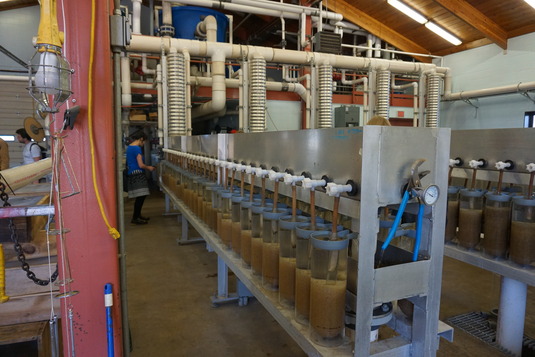
Photo Credit: David Stäblein.
Wednesday, 16 May 2018
The morning started with a discussion on tribal management and wildlife at the Northern Great Lakes Visitor Center with Sheamus Johnson (master’s student in the Nelson Institute working with Dr. Larry Nesper in the Department of Anthropology at UW-Madison), Melonee Montano (traditional ecological knowledge outreach specialist for the Great Lakes Indian Fish & Wildlife Commission [GLIFWC]), Peter David (wildlife biologist with GLIFWC), and Travis Bartnick (wildlife biologist for GLIFWC). We again encountered the ominous chronic wasting disease (a transmissible illness of the deer family), the concept of traditional ecological knowledge used in natural resource management, and the role of the wolf in Native American tradition.
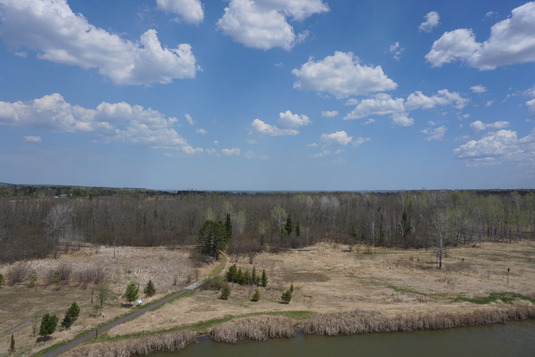
Photo Credit: David Stäblein.
In the afternoon, we learned about the elk reintroduction and habitat restoration in Flambeau River State Forest with Laine Stowell (biologist for the Wisconsin Department of Natural Resources). He showed us the state’s elk quarantine facilities and spoke about the process and problems of elk reintroduction in Wisconsin. He also addressed clashes between humans and other predators, like wolves. Since the reintroduction efforts were established, 2018 marks the first year of human hunt (or harvest) of elks in Wisconsin.
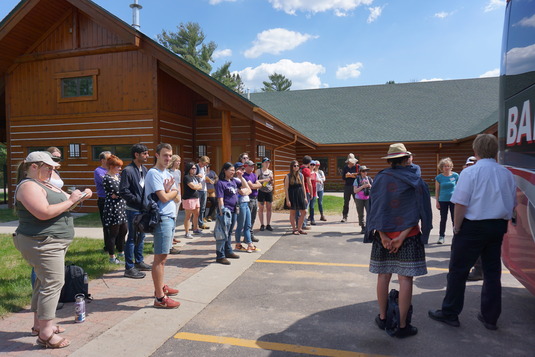
Photo Credit: David Stäblein.
Later that evening we had a discussion about the local economic impacts of sport hunting with Jim and Helen Palmquist of Palmquist farm, where we also spent the night.
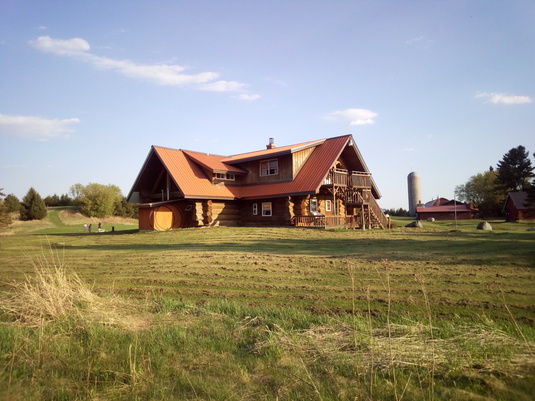
Photo Credit: Katharina Müller.
Thursday, 17 May 2018
We started our day with a tour of the Raptor Education Group’s facilities in Antigo, Wisconsin. It is a nonprofit organization dedicated to the care and rehabilitation of injured or orphaned native bird species, and to public education on wildlife issues. Marge Gibson (executive director and founder of Raptor Education Group, Inc) spoke about raptors, ecosystem services, and challenges to recovery. We were able to visit some of her patients and hear about their road to recovery.
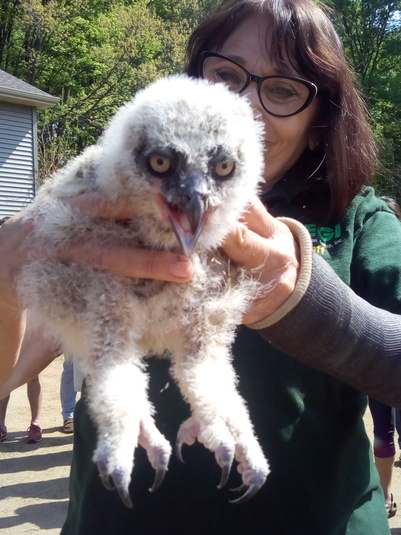
Photo Credit: Katharina Müller.
For our last stop on this journey, we visited and toured Van der Geest Dairy, a family-owned and family-operated dairy farm. The farm has expanded over the years and today covers 4,000 acres of cropland and contains 3,000 Holstein dairy cattle. The four-generation business was built on a reputation of quality service to family dairy farms, and commitment to the environment with an emphasis on the importance of agriculture.
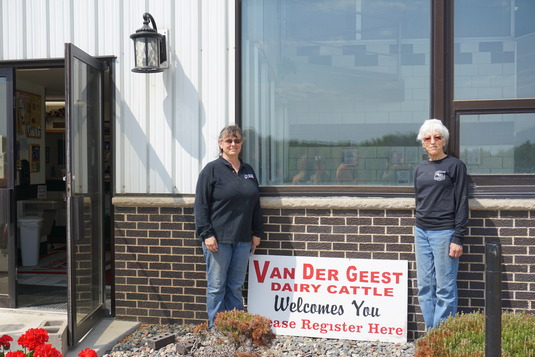
Photo Credit: David Stäblein.

